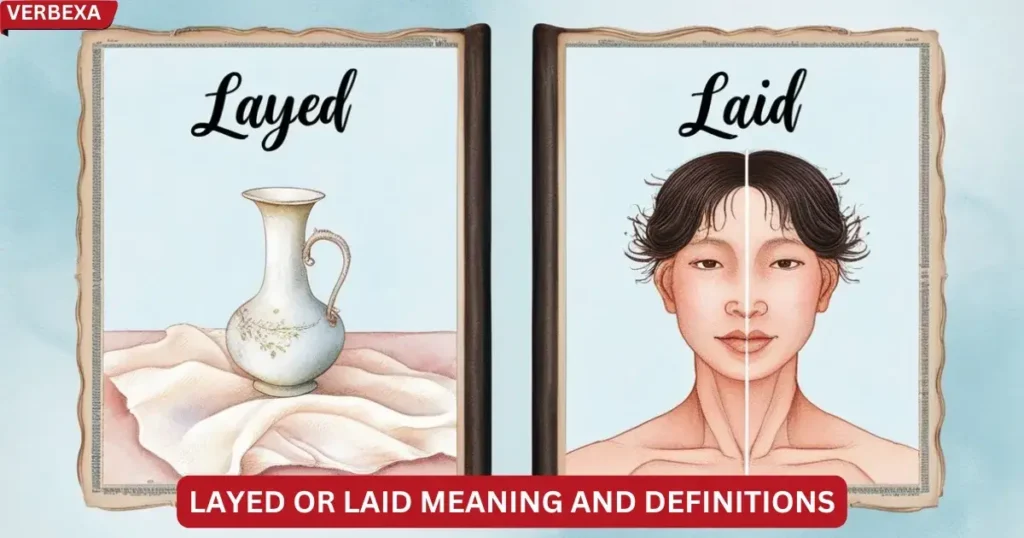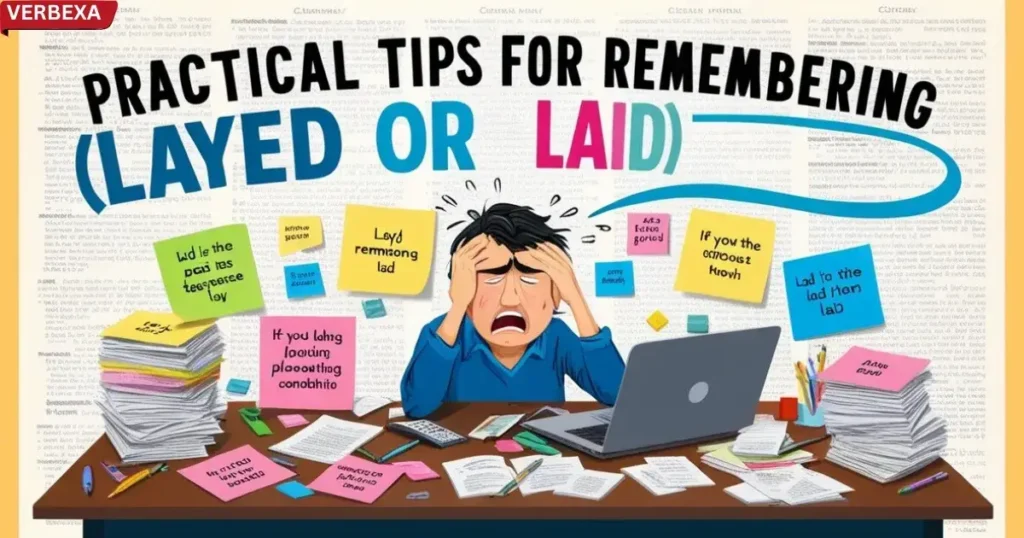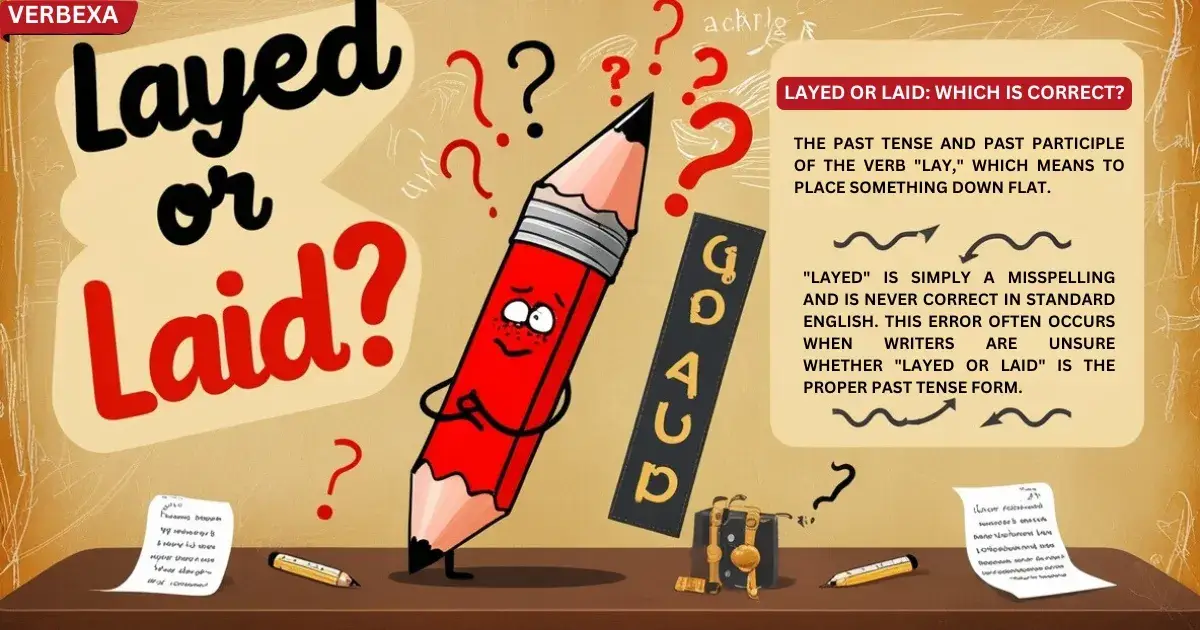Layed or laid – this common grammatical conundrum continues to perplex writers and speakers alike. The confusion surrounding these terms stems from their similar pronunciation and the irregular conjugation patterns of the verbs “lay” and “lie.” Whether you’re wondering about having “layed or laid in bed” or if you “layed or laid down” your keys, this comprehensive guide will help you master the correct usage once and for all.
Quick Answer: “Laid” is always correct, while “layed” is incorrect. “Laid” is the past tense and past participle of the verb “lay.”
Layed or Laid Meaning and Definitions

To clarify the confusion, let’s start with precise definitions and the grammatical roles of “layed” and “laid”.
The Correct Form: Laid
The past tense and past participle of the verb “lay,” which means to place something down flat.
- Past tense of the verb “lay” (to put or place something down)
- Past participle of “lay” when used with helping verbs
Example: She laid the book on the table.
He has laid the foundation for success.
She laid the book on the table.
The Common Mistake: Layed
“Layed” is simply a misspelling and is never correct in standard English. This error often occurs when writers are unsure whether “layed or laid” is the proper past tense form.
Example (incorrect): She layed the book on the table.
Grammatical Roles
- “Laid” is used when referring to the act of placing something down (past tense). Example: “He laid the bricks carefully.”
- “Layed” is a mistake. It’s often used by mistake instead of “laid.”
To avoid confusion, remember that “laid” is always the correct choice when using the past tense of “lay.”
Synonyms and Related Terms
Here are 10 synonyms for “laid,” which may help you understand its meaning in different contexts:
Synonyms for Laid (verb)
- Set
- Placed
- Positioned
- Situated
- Arranged
- Positioned
- Deposited
- Rested
- Stretched
- Located
Synonyms for “Layed”
Since “layed” is an incorrect term, it does not have synonyms. Instead, focus on using “laid” correctly. If you come across “layed” in writing or speech, it’s a clear indicator of an error.
Comparison Table: Layed or Laid?
| Feature | Layed | Laid |
|---|---|---|
| Definition | Misspelling of “laid” | Correct past tense of “lay” |
| Usage | Incorrect usage | Correct usage in past tense |
| Grammatical Role | Not used in standard grammar | Past tense and past participle |
| Common Contexts | None (incorrect term) | “She laid the groundwork” |
| Common Mistakes | Frequent misspelling | No mistakes when used correctly |
| Examples | “She layed the bricks” (incorrect) | “She laid the bricks” (correct) |
When to Use Each Term: Layed or Laid?

To help clarify when and how to use “laid” correctly, here are some practical guidelines:
- Laid is used when referring to placing something down.
- Layed is a misspelling and should never be used.
Common Writing Errors to Avoid
- Incorrect: “She layed the groundwork for the project.”
- Correct: “She laid the groundwork for the project.”
Choosing the Correct Term
When you need to use the past tense of the verb “lay,” always choose “laid.” To remember this, think of other common verbs like “say,” whose past tense is “said,” not “sayed.” Just as “say” becomes “said,” “lay” becomes “laid.”
Everyday Usage Examples: Layed or Laid
To ensure that you understand how to use “laid” and “layed” properly, let’s explore a few everyday examples:
- Laid:
- “She laid the baby in the crib.”
- “He has laid the cards on the table.”
- “I laid down to rest after the long day.”
- Layed (incorrect):
- “He layed down for a nap.” (Incorrect usage of past tense)
- “I layed my keys on the counter.” (Wrong form of the verb)
Special Contexts of Usage
- Layed or laid in bed: Always use “laid” when referring to reclining or lying down. For example, “He laid in bed for hours, reading a book.”
- Layed or laid down: Similarly, “laid down” is the correct form when referring to the action of reclining or placing something down. For example, “She laid down her pencil.”
- Layed or laid an egg: The correct term is “laid” when referring to the act of an animal (or sometimes a person) producing eggs. For example, “The hen laid an egg.”
- Layed or laid off: Use “laid off” to describe the termination of employment. Example: “He was laid off due to budget cuts.”
Practical Tips for Remembering

- Think Pattern: Lay → Laid → Laid (like pay → paid → paid)
- Context Clue: If you’re describing placing something, use “laid”
- Simple Rule: “Layed” is never correct in any context
- Memory Aid: “Laid is legit, layed is wrong”
Common Contexts and Examples
When Discussing Rest or Sleep
- Correct: “I laid down for a nap.”
- Incorrect: “I layed in bed all day.”
In Professional Contexts
- Correct: “The company laid off several employees.”
- Incorrect: “The workers were layed off.”
In Construction or Building
- Correct: “They laid the groundwork last week.”
- Incorrect: “They layed the bricks incorrectly.”
Conclusion
In summary, “layed or laid” is a common confusion in English, but it’s easy to understand once you grasp the rules. The key difference lies in the fact that “laid” is the correct past tense and past participle of “lay,” while “layed” is an incorrect misspelling.
To avoid mistakes, remember that “laid” is always the right choice when referring to placing something down in the past. Whether you’re talking about “laying down in bed,” “laying the groundwork,” or even “laying bricks,” “laid” is the proper form to use.
Quick Recap:
- Laid = Correct
- Layed = Incorrect (common misspelling)
- Always use laid when referring to past actions of laying something down.
By following these rules and using the correct form, you’ll avoid common mistakes in writing and improve your overall grammar accuracy. Now that you’re clear on the difference between layed or laid, you can confidently apply these terms in any situation.

This author is a passionate linguist and grammar enthusiast, dedicated to helping individuals master the art of language. With years of experience in teaching and editing, she brings clarity and precision to every sentence. Tina’s mission is to empower writers of all levels to express themselves with confidence and excellence.

